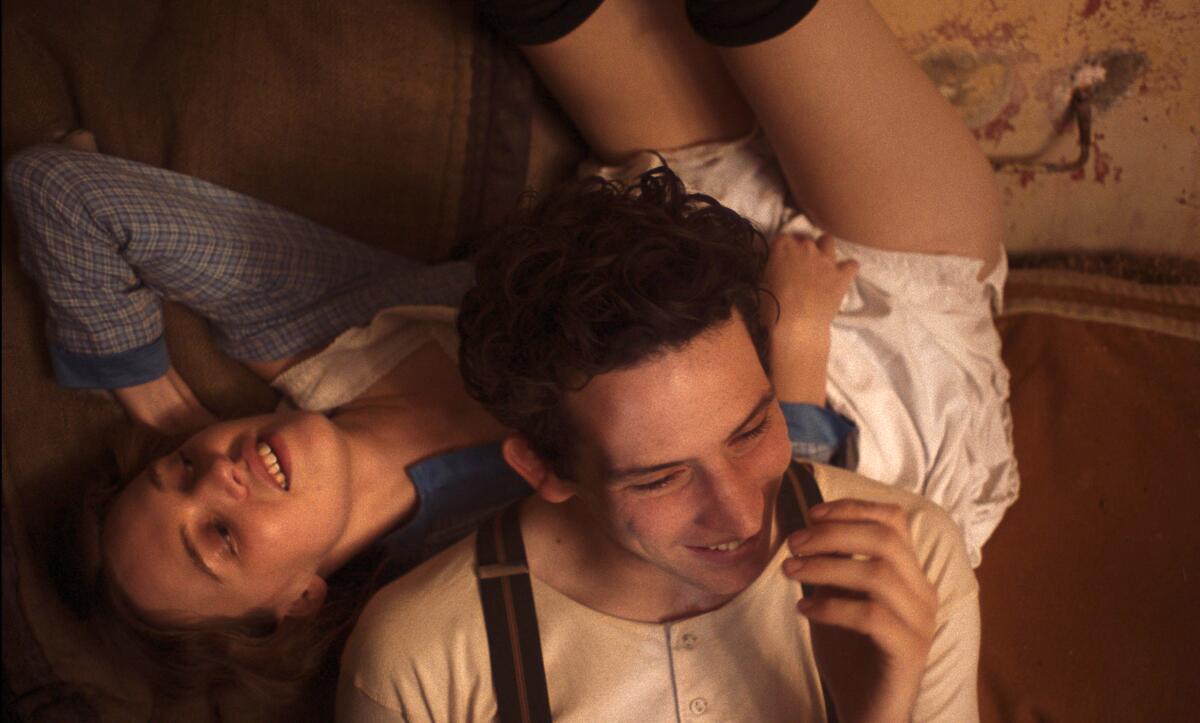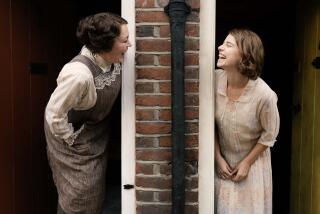A secret love infuses sensual, melancholic ‘Mothering Sunday’

- Share via
“Mothering Sunday” is a prestige movie bathed in sunlight, fixated on the sensual but tinged with an unspoken darkness. Set on a gorgeous English day in 1924 — lived by a young woman with a secret and remembered by her years later as a writer in love — it’s an unhurried reverie that’s sometimes as wonderfully sustained as a fermata but also occasionally stifling due to filmmaker Eva Husson’s dedication to that tonal approach above all else.
In its flush brevity, British writer Graham Swift’s 2016 novella intended to exult in the glory of a day marked by intensity of feeling, even as it also underscored the fragility in seizing joy amid so much pain: in this case, the lingering pall felt in so many English households after World War I nearly erased a generation of sons.
For your safety
The Times is committed to reviewing theatrical film releases during the COVID-19 pandemic. Because moviegoing carries risks during this time, we remind readers to follow health and safety guidelines as outlined by the CDC and local health officials.
Husson’s film, adapted by Alice Birch, is very much attuned to the cinematic rendering of that twinned wavelength. The “Once upon a time” heard in the opening moments, the shots of empty rooms in a well-appointed manor, the searching power on star Odessa Young’s face as she appears to be looking out of a window, and Josh O’Connor’s soft voice recalling a pleasant childhood memory with his brothers are clues that we’re in for a mood piece as much as a story.
Narrative emerges soon enough, however, in the Niven household, where the housemaid of seven years, Jane Fairchild (Young), serves breakfast and learns she has the day off while her employers, Godfrey (a halting, affable Colin Firth) and Clarrie (a compellingly morose Olivia Colman), attend a riverside lunch with their tightknit fellow tribes the Sheringhams and Hobdays.
Jane’s extra time is soon occupied, however. Letting her hair down, she bicycles to a rendezvous with her lover of many years, the Sheringhams’ only surviving son, Paul (O’Connor), who has fabricated an excuse for why he’ll be late attending his elders’ lunch, intended to commemorate his upcoming wedding to the Hobdays’ daughter Emma (Emma D’Arcy). Jane’s and Paul’s bond goes beyond stolen lovemaking in daylight and a romantic torpor — they seem to understand each other as a beautiful, private reality hidden from the sadness of the world and the lives it prescribed to each of them.
The blithe sexual intimacy and half-teasing/half-confessional exchanges of this pair’s late-morning dalliance are rapturously lit by cinematographer Jamie D. Ramsay and wonderfully realized by Young and O’Connor, whose chemistry reminds one of classic golden age of Hollywood couplings — just add copious nudity.
Their time together (in and out of brilliant costumer Sandy Powell’s exquisite period threads) stands in marked contrast to what Husson cuts away to — the grim propriety of a bereaving parents get-together and flash-forwards to Jane as an ambitious author mining that languorous day for creativity as she nurtures a relationship with a caring Oxford philosopher (a magnetic Sopé Dìrísù).
The lunch scenes benefit from Colman’s coiled maternal sorrow, which erupts into rage, and later a hard, poignant wisdom about why Jane being an orphan protects her from the weight of caring and being cared for. The jump-aheads, however, don’t necessarily enrich the film’s suggestion that Jane is the writer she is because of a youthful day of passion, truths, goodbyes and a solo, nude wandering through a fancy house. (Glenda Jackson’s late cameo as Jane the literary legend, though, is a small marvel of what a face can do to suggest a deeply considered and enjoyed life.)
Husson’s commitment to the dreamlike is notable, but the arch framing, careful rhythms and drowsy line readings start to feel like a crutch at a certain point when the emotional thickness in the air begs to be explored in scenes more grounded than elliptical. Nevertheless, “Mothering Sunday” still shimmers with confident filmmaking, fine performances and a belief in the melancholic resonance of a lovers’ sanctuary as something difficult to let go of. Because why would anyone want to?
'Mothering Sunday'
Rated: R for sexual content, graphic nudity and some language
Running time: 1 hour, 44 minutes
Playing: Starts March 25, the Landmark, West Los Angeles; AMC the Grove, Los Angeles
More to Read
Only good movies
Get the Indie Focus newsletter, Mark Olsen's weekly guide to the world of cinema.
You may occasionally receive promotional content from the Los Angeles Times.










